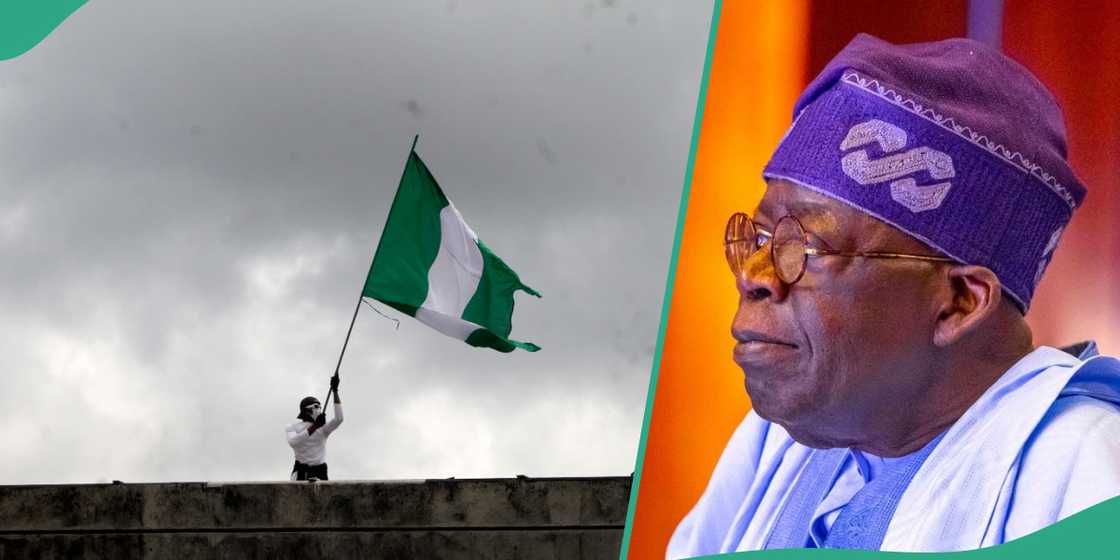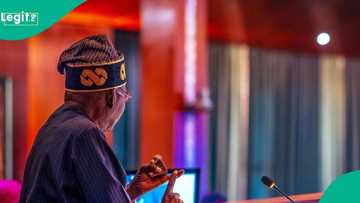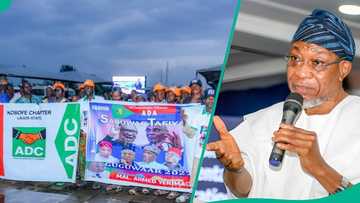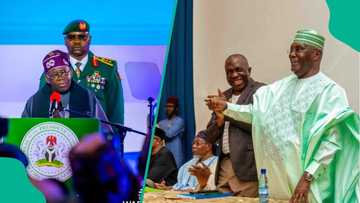June 12: 25 Important Takeaways from Tinubu’s Powerful Democracy Day Speech
- President Tinubu reaffirmed his commitment to democracy, national unity, and economic progress during his Democracy Day speech, paying tribute to June 12 heroes and highlighting key reforms
- He strongly rejected claims of a one-party agenda, called for collaboration between the executive and legislature, and outlined his government’s achievements in inflation control, GDP growth, and security
- Tinubu unveiled plans for a national fibre optic project, tax reforms, and youth empowerment programmes while emphasising Nigeria’s self-sufficiency, economic growth, and diaspora engagement
FCT, Abuja - President Bola Ahmed Tinubu addressed a joint session of the National Assembly on Thursday, marking Nigeria’s Democracy Day.
His speech highlighted national unity, economic progress, political inclusiveness, and his commitment to democratic governance.

Source: UGC
Tinubu also paid tribute to the heroes of the June 12 struggle, reaffirmed his position on security reforms, and strongly dismissed rumours of a one-party agenda.
Legit.ng has compiled a list of 25 key takeaways from his powerful address:

Read also
Former army chief advocates mandatory military drills for Nigerian youths amid worsening insecurity
1. June 12 as Democracy Day
Tinubu reaffirmed June 12 as a symbol of Nigeria’s democratic restoration and paid tribute to Chief MKO Abiola and other heroes who fought for democracy.
2. Tributes to democracy icons
Honours were extended to numerous activists, journalists, and politicians, including Kudirat Abiola, Anthony Enahoro, Gani Fawehinmi, and Ken Saro-Wiwa, for their role in the pro-democracy struggle.
3. Posthumous honours and pardons
Dozens of national heroes, including members of the Ogoni Nine, received posthumous honours, and full presidential pardons were granted to some of these figures.
4. No to one-party state
Tinubu assured Nigerians he would never support or pursue a one-party state, labelling such fears as “panic alarms.”
5. History of opposition
He recalled his time as the last opposition governor in the South-West in 2003, underlining his steadfast commitment to multi-party democracy.
6. Call for tolerance
Tinubu emphasised the importance of tolerating criticism, supporting free speech, and avoiding the suppression of dissent in a democratic society.
7. Legislative history praised
He praised the National Assembly for its defence of democracy during the third-term saga (2006) and the 2010 doctrine of necessity.
8. Partnership between arms of government
The president called for collaboration between the executive and legislature to drive national development.
9. GDP growth
Tinubu highlighted that Nigeria recorded a 3.4% GDP growth in 2024, with Q4 reaching 4.6%, the highest growth rate in a decade.
10. Inflation control
He announced that inflation was easing, and the prices of essential goods like rice and beans were stabilising.
11. Forex stability
Net foreign reserves increased fivefold, and the naira exchange rate stabilised.
12. Improved fiscal health
States can now pay salaries without borrowing, marking a significant improvement in the country’s fiscal health.
13. CREDICORP scheme
Over 100,000 Nigerians, including 35,000 civil servants, have benefited from consumer credit, with 400,000 more expected to benefit from July.
14. National Credit Guarantee Company
A new initiative, backed by ₦100 billion, was launched to support SMEs and industrialisation in Nigeria.
15. Empowering youth
Tinubu highlighted investments in education, skill acquisition, and job-readiness programmes like NELFUND to empower Nigeria’s youth.
16. Digital infrastructure
The launch of a national fibre optic project was announced to enhance internet access and bridge the digital divide.
17. Manufacturing boost
Plans were shared to grow the economy by 7%, increase local food production, and achieve food sovereignty.
18. Infrastructure investment
Tinubu stressed the importance of investing in roads, rail, ports, and power sectors to support industrial growth.
19. Comprehensive tax reform package
A tax reform package is awaiting presidential assent, aimed at reducing tax burdens and promoting business growth.
20. Office of the Tax Ombudsman
The establishment of the Office of the Tax Ombudsman was announced to ensure tax transparency and protect the rights of taxpayers.
21. Use of digital tools
Digital tools will be employed to track performance, reduce waste, and improve accountability in government operations.

Read also
Tinubu speaks on Nigeria's economic woes in St. Lucas: “We inherited a country near bankruptcy"
22. Enhanced security operations
Criminals and terrorists are being pushed back, with improved inter-agency cooperation and the use of technology in security operations.
23. Recognition of armed forces
Tinubu acknowledged the sacrifices of Nigeria’s armed forces and called for national support and appreciation of their efforts.
24. Diaspora engagement
The president announced new initiatives, including a Diaspora Bond and non-resident BVN initiatives, to involve Nigerians abroad in national development.
25. “Nigeria First” policy
Tinubu reiterated his “Nigeria First” policy, promoting self-sufficiency, economic growth, and national pride as core principles for the country’s future.
Protesters mobilise against Tinubu at NASS
Previously, Legit.ng reported that the Take It Back Movement is set to clash with security operatives at the National Assembly Complex in Abuja as President Bola Ahmed Tinubu prepares to address the nation from the legislative headquarters.
President Tinubu will address a joint session of the Senate and House of Representatives after cancelling the previously scheduled nationwide broadcast in commemoration of Nigeria’s 26th Democracy Day anniversary on Thursday, June 12, 2025.
Source: Legit.ng




